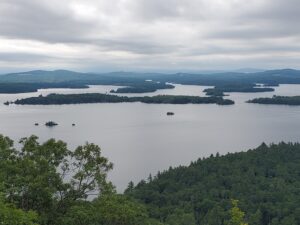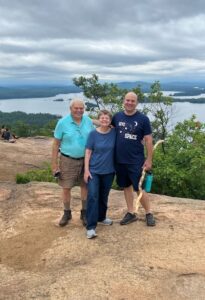By Jim Norman

I’m taking the liberty of turning a little personal in this column, in two ways: What does turning 80 mean to me, and what does divinity mean to me?
It could be that being in the woods around Squam Lake in New Hampshire has had a bearing on my thoughts on both of these questions, whether to bring clarity or cloudiness I leave to you to say.
Ginger and I decided to climb to the rocky top of Rattlesnake Mountain this morning, a climb we’d done in years past just to enjoy a spectacular view of the lake and islands below.

But this year, I could not deny the impact of an additional quest: Simply put, could we do it? Or, would we have to face the unwelcome fact that age had taken its toll and perhaps it just made sense to act our ages.
Spoiler alert: We did it, with the payoff of the same marvelous view we had come to expect from previous years, but topped with a sweet dressing of gratitude.
An atheist and Easter
As I walk, it is not only my feet that wander, but my thoughts, as well. On this day, my mind turned to an interesting question posed by a social media friend I have never actually met: Can a person calling himself or herself an atheist properly partake in ritual practices associated with Christian holidays, such as Christmas and Easter?
For me, the answer is easy: Sure, no problem. Especially since many of those ritual practices, like the Christmas tree and the hunt for decorated chicken eggs hidden by the Easter rabbit, were adaptations lifted directly from earlier European religious traditions that modern society has, with the arrogance of unrepentant thievery, labeled as “pagan.”
But that started me thinking about the nature of divinity, more deeply than Christmas trees and Easter eggs and biting the ears off chocolate bunnies.
At our Sunday morning meetings, we state explicitly that we in Ethical Culture are a religion of human relations, and that we impose no requirement with respect to belief, or disbelief, in a supreme being. That, we say, is a matter of individual conscience.
Divinity in the natural and manmade world
As I walk up the mountain, I hear frequent rustlings in the underbrush and turn just in time to catch a glimpse of a chipmunk scurrying to a hiding place with his cheek pouches full of seeds and his tail in high alert, lest it be snagged by a pursuing predator; I see divinity in that.

As I pass over well-maintained trails with stone and timber steps installed in many places by hundreds of unnamed volunteers over the decades, I see divinity in that, as well.
And when I get to the summit and take in the majestic panorama of all-embracing sky, clouds, surrounding mountains, water, and islands below, I feel a divine presence in that, too.
Even in my own presence as a part of this grand tapestry of life do I feel the flame of divinity.
Let’s worship the all-ness
Does any of this mean I need to subscribe to belief in a supreme deity, an all-powerful architect responsible for what I sense as divine? I don’t think so.
I am satisfied, content in my determination that we all play a part in the unity of what is, known and not yet known. If I worship anything, let it be the all-ness of which I, and you, are a part.
And let us never forget our responsibility toward one another to preserve the divinity of our lives and all that makes our lives possible.
Jim Norman is president of the Ethical Culture Society of Bergen County.
